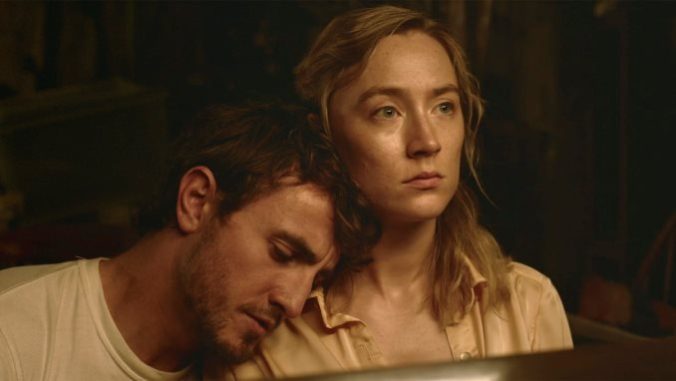Foe Mixes A.I. Tropes with Tired Twists

We’re barely into our Age of A.I., but the story trope of swapping a highly advanced, bio-synthetic A.I. in place of an actual human being, then seeing what happens is already played out. Maybe Rod Serling had the purest canvas to tackle the concept in the ’50s and ’60s with his smartly written episodes of The Twilight Zone. In 2023, few screenwriters are coming at the topic with something really fresh to say. Author Iain Reid went for it with his 2018 novel Foe, and has revisited the same story again by co-writing a film adaptation with director Garth Davis (Lion). Perhaps what was once haunting and unsettling on the book page has not, in more overt staging, translated well to the screen.
The film sticks closely to the spine of Reid’s book, while opening up the world to be more cinematic. It remains a relatively austere tale set in Midwestern America, 2065. Climate change, extreme drought and mass migration has turned global land masses into wastelands. Nothing grows on the parched land that Junior (Paul Mescal) inherited from his family’s farm. In fact, the only thing he and his wife, Henrietta (Saoirse Ronan), produce (and in excess) is sweat as they softly prowl around their weathered two-story homestead. Aside from Junior’s job at a local chicken processing plant and Hen’s waitressing job, their lives revolve around supporting a dying farm he is surly about leaving.
It’s the unannounced, solo arrival by night of the magnetic Terrance (Aaron Pierre) that throws their petrified existence into disarray. Terrance works for Outermore, an omnipotent tech company that works with governments to recruit lottery-selected candidates to become inhabitants on an orbiting space station that is in Beta-testing. With the planet withering, resources have been redirected to the station, which is seen as humanity’s resettlement savior, as long as some kinks can be ironed out by the “heroes” who volunteer for two-year tours. Junior is one of those picked. When he balks about leaving Hen behind, Terrance tells him the “choice” is actually a warmly framed conscription, so get over it. However, Outermore isn’t heartless. They’ll create an A.I. “human substitute” that will essentially be a clone of Junior, to the smallest detail, so Hen isn’t left alone to rot all by herself.
Can you sniff where this is going? In two-year prep countdown, Junior bonds with Hen more deeply than ever before as he frets about his impending exit date. That’s exacerbated when Terrance moves in to observe the couple and intimately quiz them about their communication. Junior becomes paranoid about Terrance’s ulterior motives, and alludes to what is really going on under the surface.
-

-

-

-

-

-

-

-

-

-

-

-

-

-

-

-

-

-

-

-

-

-

-

-

-

-

-

-

-

-

-

-

-

-

-

-

-

-

-

-








































